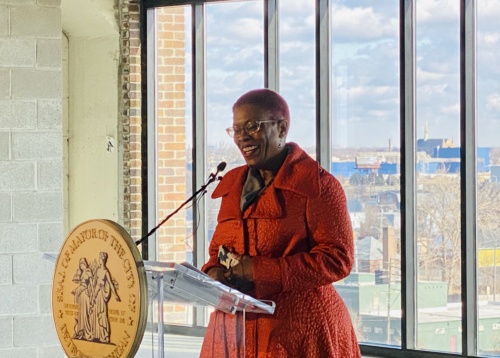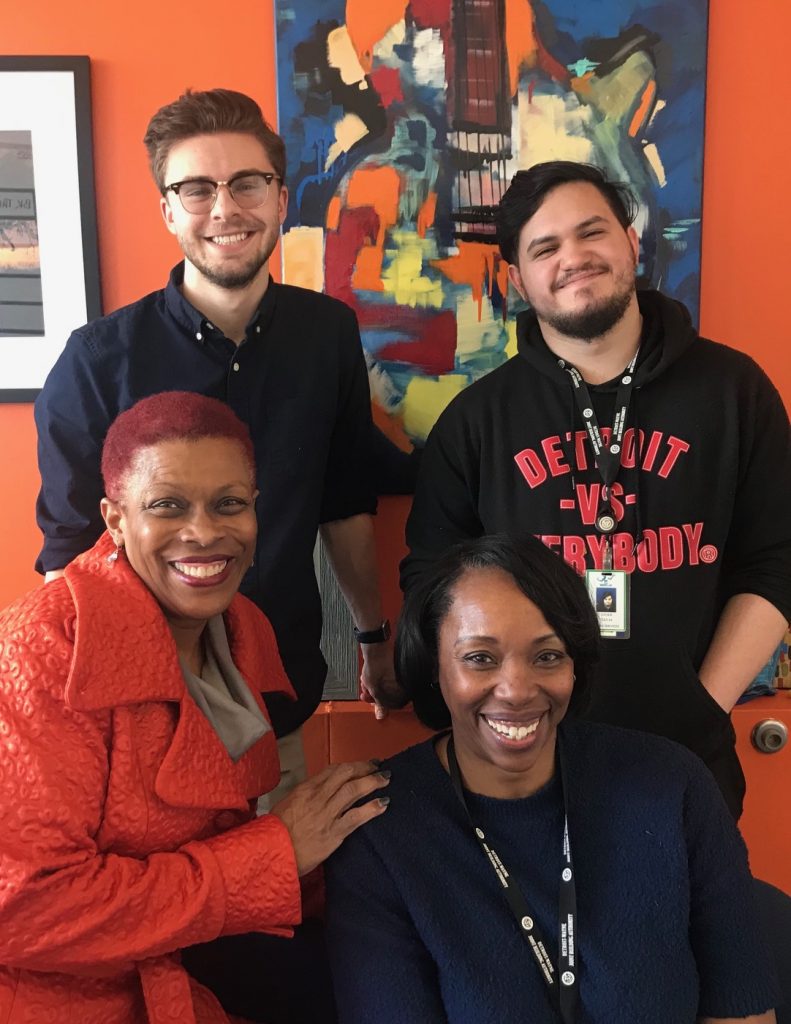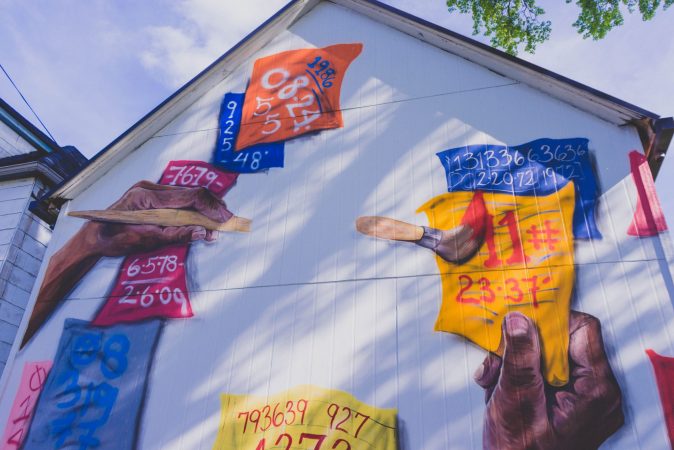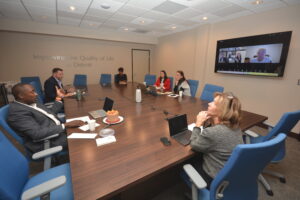
ROCHELLE RILEY, DIRECTOR OF ARTS AND CULTURE FOR THE CITY OF DETROIT
Like most walks of life, art and those who create it have seen the normalcy of day-to-day life changed almost overnight amid the ever-changing coronavirus pandemic. Speaking on the current situation, Rochelle Riley, Director of Arts and Culture for the city of Detroit, spoke to us about art and culture at a time when both matters are increasingly critical.
Growing up in Tarboro North Carolina, Riley had been a writer since she was eight years old, and given her passion, she went on to study journalism at the University of North Carolina. After her time at university, she went on to work for five different newspapers including the Washington Post, the Dallas Morning News, and The Courier-Journal in Louisville, Kentucky.
Riley, who had focused much of her writing on children, race, and the arts, was recruited to Detroit as a columnist for the Detroit Freepress. Following some time in the motor city, her next professional move was to become the Director of Arts and Culture, a role built around her, after she expressed interest to the Mayor to open a Detroit Black Repertory Theater in the city.
Holding her role for about 11 months now, Riley, whose connection with the arts includes writing, photography and painting, believes that the arts and culture of the city of Detroit are one of it’s most valuable resources.
WHAT ARE THE FINANCIAL REWARDS OF ART AND CULTURE TO THE COMMUNITY?
One thing that’s most important for me in this job is to show people how big and how great we are. So, I want to do an artist census to show how many creatives we have in Detroit because I would absolutely dare anybody to convince me that we don’t have more creatives or artists and musicians designers, architects, and dancers and fashion designers that we don’t have more per capita than any city in the country.
I don’t have a number for Detroit but nationally in 2017, the Creative Arts, culture and creative industries combined contributed more to the gross national product than the auto industry, something like 4.6% to 3.8%. I read that and I was stunned because first of all I didn’t know it, and I can’t figure out why we don’t have that number for Detroit so we can tout it all the time.
So that’s the type of research that I’m doing just to make sure people know what we are and who we are and how great we are because when you can embrace that you’ll be willing to support it. And I have to get people to be willing to start supporting the arts in a big way.
We have lots of foundations who have been awesome and they have carried the artistic ingenuity and innovation of this community, but we need for people to be proud of Detroit and Metro Detroit because this artists fund that we created is for Wayne County and Oakland County, artists who work in Detroit but live in the suburbs.
HOW ARE YOU SUPPORTING ARTISTS WHAT ARE LEFT WITHOUT WORK TODAY?
There are two things. The very first thing that I did, because artists are out of work, I want people to understand when they see that there’s money for the arts or somebody starts a fund to help the arts, those are usually for arts organizations and nonprofits, so they can then help you know each other. This is for artists, independent contractors who literally when COVID happened, lost all their income. No exhibitions, no shows, no appearances, all of that was canceled.
I wanted to help them. I wanted to make sure that somebody was helping them, which is my job. The entire city is doing absolutely amazing work helping everyone, small businesses, people who need help with food, people who need help with housing.
What I want people to remember is that artists are people who need all those same things. They’re not all Big Sean or Alicia Keys, they’re folks who literally, you know, go and play in a club on a Friday and Saturday night, and some of them are paid in cash for summer painting all week and the big exhibit they were supposed to have on Saturday to sell their work was canceled.
So the partnership with MOCAD was to make sure that some of those artists whose work is sitting there had a chance to sell it. And I’m so proud of that partnership. What they did was they allowed me to send them artists and work, and then they sold the work and it then also benefits MOCAD, which is one of our great galleries. With the artists, they split the profits 50/50.
The second initiative which is totally separate in the ACE fund the Artist Crisis, Emergency fund. So the system is literally a campaign just to raise money for $500 unrestricted, no questions asked grants to any artists who are suffering right now and who have lost gigs because of COVID-19. You can still watch the telethon here.
WHAT’S THE RESPONSE TO THE PROGRAMS PUT FORWARD BY YOUR OFFICE?
It’s actually going very well and we’re about to kick it up a notch. People can write checks and we’ve had wonderful folks actually write checks so that doesn’t show up on the GoFundMe page. Anybody can go to detroitmi.gov/ACE to get an explanation of the fund and how to donate, and how to apply to get it.
Mitch Albom and I are partnering to host a telethon featuring artists’ works. These are artists who will be performing, creating something, or talking about their craft. And in between will be messages of hope and encouragement from other artists and other important folks. So we’re pulling that together so that people can really get a sense of who they’re helping.
WHAT DO YOU THINK OF STREAMING SERVICES, AND COULD THEY HELP A COMMUNITY SUCH AS DETROIT?
Well, I believe in taking advantage of everything that’s offered so what we’ve been doing on our ACE page is letting artists know about everything we hear about whether it’s a huge fund that started in New York proposed nationwide or whether it’s something that Harpo, Oprah Winfrey’s company, was doing or something like streaming services. I’m not making judgments right now on any effort to help what I’m doing is making sure artists know about them.
IS THERE A TENDENCY TO BE CLOSER TO ONE TYPE OF ART COMPARED TO ANOTHER IN DETROIT?
Well, I think that what you have is what’s typical in any city or any genre – there are people who like what they like. In New York, the people who love MoMA are the people who love MoMA, the people who love the MET are the people who love the MET, and there are folks who have no interest in fine arts because they’re only interested in music.
What I want people to do is embrace everything that we have to find the thing that they like. I’m going to be hosting a series of Zoom conversations called genre conversations because they’re going to be about specific things to make sure that people who are in those spots and in those spaces have a chance to talk. There’ll be one on fashion that we want for record producers and label owners.
There’s going to be one for designers and architects, there’s going to be one to two for musicians because the folks with the symphony along with the Michigan Opera Theatre orchestra are different from the folks who are trying to figure out whether there’s going to be a Movement festival in September.
There’ll be about 10 of these, and each of them is designed to find out where people are, how the city can help, and what we look like afterward, because I’m spending a third of my time on relief, a third of my time on a special assignment that the mayor has given me and a third of my time looking at post-pandemic where we go after that. We can’t start to plan for that in October or December we have to start planning for it now.
WHAT DOES THE POST-PANDEMIC FUTURE LOOK LIKE?
So, that’s not a question for me, that’s a question for the Mayor, who has done amazing work internationally lauded for how he’s staying ahead of the game. I’m going to let him speak to those things that are better for the entire city, and he’s working with the governor who has also been amazing on working for the entire state.
My portion of the work that he wants me to do has to do with art and culture and what we do for artists, and that’ll be a part of a larger plan.
HOW DO YOU WORK THROUGH THESE PLANS, ARE THERE STAKEHOLDERS, OR ARE YOU THE SOLE BRAIN POWER?
I can tell you that every single week that I’ve been on this job I’ve had people to tell me, “Gosh, here’s a person for this job because of what you used to do,” and as a columnist, I’ve talked to, I don’t know, almost everybody in that building over the past 20 years. Not just in that building but around the city, everything that I do is about partnerships, I partner with people that I used to write about I partner with people that I know because of things that I wrote about, and when you have no budget and you’re in the middle of a pandemic, you get it done however you can.
As a matter of fact, I was so excited that I completed my first budget and it got through to be included in the mayor’s budget and then, of course, COVID hit and the city would have been more than $300 million in debt without the mayor’s efforts to change that. So, you know, just dust yourself off and start over again.
WHAT PARTS OF DETROIT DID YOU FREQUENT, AND WHAT PARTS CAN’T YOU WAIT TO GET BACK TO?

ACE DIRECTOR ROCHELLE RILEY (LEFT) HANGS WITH THE ACE TEAM AFTER THE OFFICIAL WINTER ANNOUNCEMENT OF THE CITY’S STRATEGIC PLAN FOR THE ARTS. SHE IS JOINED BY (FROM LEFT) ROB SWETLIC, KIM THEUS AND XAVIER CUEVAS
I frequent the whole city, the very first thing I did when I took this job was a listening tour of the city, to all seven districts. I have already been in all seven districts, but I took the tour to learn specifically about art.
But, I can tell you this, as soon as I get out of here, I am going over to Sweet Potato Sensations to get a sweet potato pie, and then I’m going to head over to the Avenue of Fashion to get my coffee. Then, I’m going to Eastern Market where I can get vegetables that I can actually touch myself and know that they’re what I want.
DO YOU THINK THAT DETROIT ARTS AND CULTURE GETS THE RECOGNITION THAT IT DESERVES?
It depends on who is speaking and where you are. When I was in Amsterdam, like 10 years ago, and said I was from Detroit people got all excited. They love the city, they love Motown, they were singing Motown music with me.
People who think that somehow the arts were not as important or not as special in Detroit, the hashtag for my campaign, and my office is #DetroitNeverLeft.
I want people to come back, and I want people who are here to feel like they can stay. Our artists make more money outside of Detroit than in Detroit because we don’t recognize their genius, we don’t celebrate it. We need to start doing that. So it’s always been here but what you’re seeing is a recognition of that and how there’s great excitement here for what we’re doing.
LASTLY, WHAT CAN YOU TELL US ABOUT BRIDGING THE DIGITAL DIVIDE BETWEEN THE CITY AND STUDENT’S?
One of the main goals that I have is to make sure that we provide an avenue for young people to feel the same sense of purpose and future that young DPS students did when they used to race over to Hitsville USA to audition with Berry Gordy. What people need to remember is all those Motown stars, they were DPS (Detroit Public School) kids who were brilliant and wanted a chance.
We have those same kids now who can do so many things. A lot of it is on the computer and on the web, so I have big plans post-pandemic for making sure that they get what they need.
When people go to my Twitter page the bio says, “I am not just my ancestor’s wildest dream, I am their victory,” I live my life every day like that to make sure that people know that we can be the best that we can be no matter who you are. But, you know, it’s not where you start, it’s where you go.



















